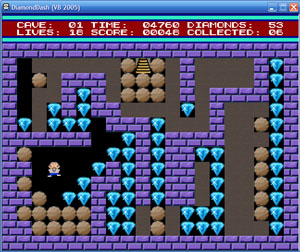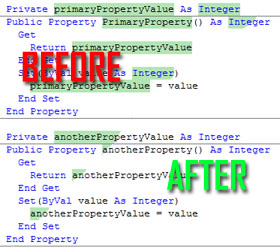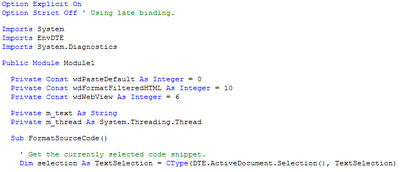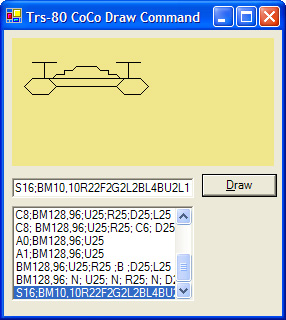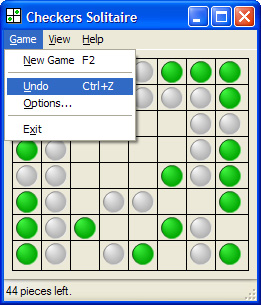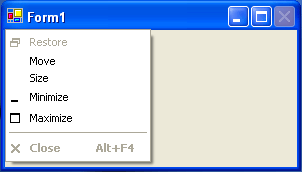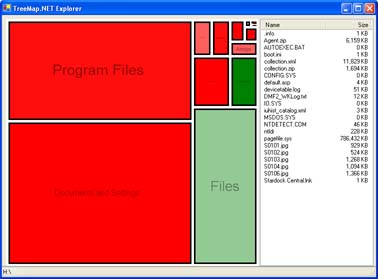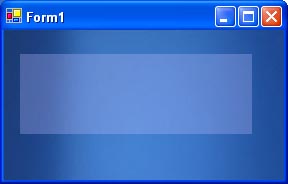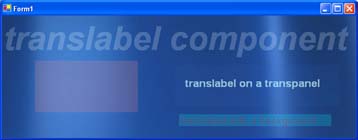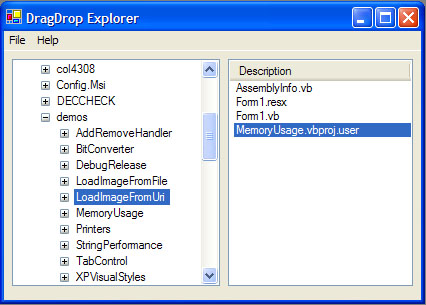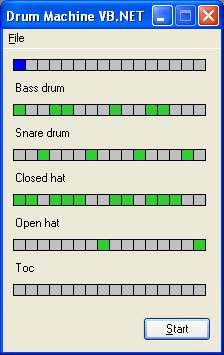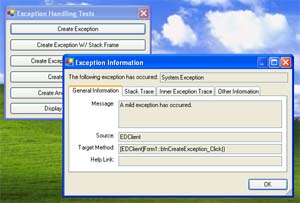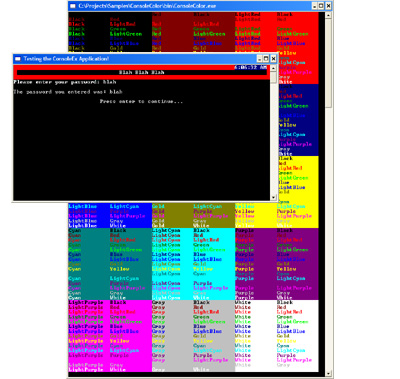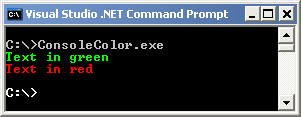Downloadable Samples
Windows Forms: Solitaire
First it was a C/C++ application that ships with Windows. Then it was in C#. Now it’s in VB.NET! Please read the announcement for more information.
Windows Forms (VB2005): DiamondDash - Boulderdash Clone
The goal of the game is to collect a given number of diamonds and exit the level without getting hit by stones or ghosts. The status line tells you the level, number of lives, diamonds you collected and how many you need to collect. But more importantly, you can use this as a starting point for creating your own tile based level oriented game and learn a few things about VB 2005 in the process.
Visual Studio: Macro - Reload Current Document (Snippet Color Work-around)
This macro will automatically retain your current cursor position (current document), save the file, close the file, open the file and place your cursor back to it’s previously stored location. This is a work around with the Snippet feature in VB 2005 keeping the coloring around seemingly forever (or at least until you close and open the file).
Visual Studio: Macro - Format Code to HTML
Using this macro, mark the code you want to paste into your blog and press the tool bar button (or associated hot key) then switch to your blog entry tool and paste. This Visual Studio .NET macro to automates the process of converting source code to a format that you can post to a blog (or any other web page) by leveraging Microsoft Word’s HTML features. This process will create the “clean” version of HTML, not the default HTML that Word produces - a feature that many people might not be aware of.
Windows Forms: CoCo Draw Returns - Travel back in time… 20 years or so
After reading through some old magazines… I was reminded of a form of drawing used on the Color Computer during the mid-80’s. I figured, as a nice diversion, that it’d be kind of cool to resurrect this using .NET. Useful? Not really sure, but it was a fun diversion. ;-)
Windows Forms: Checkers Solitaire
An original game by Cory Smith inspired by a game written circa 1978 by David H. Ahl.
Windows Forms: Disable the Close Button
This article (and code) answers how to disable the close button without having to remove the system menu, minimize and maximize buttons.
Windows Forms: Microsoft Research TreeMap Explorer
Looking for an interesting way to view your hard drive usage, then look no further.
Windows Forms: Developing Owner Drawn User Controls - Part 1 (TransPanel)
Part 1 of a collection of walk through articles that details the creation of several user controls that follow a theme. The them being semi-transparent controls that allow you to set the opacity level (similar in look to the Windows Media Center Edition application). However, instead of just showing you how to create the component, I hope to show the actual process of creating user controls from scratch which also includes the trial and errors occurring along the way and possible design changes during their evolution.
Windows Forms: Developing Owner Drawn User Controls - Part 2 (TransLabel and TransPanel’s Revenge)
Part 2 in a continuing series on developing custom owner drawn controls. In this installment, you will be developing a custom label control and improving upon the TransPanel control.
Windows Forms: Tree View, List View, Drag/Drop and Command Pattern
Demonstrates using the Tree View and List View utilizing drag and drop behavior. Mimics the hover behavior found in most Microsoft products using a Tree View. Efficient loading the the folder hierarchy. Demonstrates using the Command Pattern for menu and keyboard actions.
Windows Forms: Coding 4 Fun - Building a Drum Machine with Direct Sound
A port to VB.NET of the drum machine sample.
Windows Forms: Creating a Reusable Exception Dialog for .NET Applications
Code for Jason Bock’s reusable exception dialog article to ported to VB.NET.
P/Invoke: Revenge of Drive Info
A stronger, faster and more powerful version of Drive Info using P/Invoke.
WMI: Computer Info (Expansion of Drive Info)
Demonstrates using WMI to determine various computer specific data such as cpu, motherboard, BIOS and hard drive information.
WMI: Drive Info
Demonstrates using WMI to determine various hard drive information including drive model, type and manufacturer serial number.
Console: Control Your Console (Console Color Take 2)
In the first round, you learned how to take control of the colors within the console window. Well, now you can clear the screen, change the title of the window, manipulate the cursor position, determine the size of the console, etc. The included test application shows how to utilize a few of the extensions that ConsoleEx provide such as determining if the window hasn’t been scrolled, updating a time display in the upper right hand corner using a timer while prompting the user for a password, center text on a line and run through all the combinations of the foreground and background colors available.
Console: Color Your Console
Have you ever wanted to (or even knew that you could) change the color of the console output? Well, here’s how you can do so!
CodeSmith: Array List Template for VB.NET
A template for generating a strongly-typed Array List collection for VB.NET.
GotDotNet
- DirListBox.msi This sample control demonstrates how to extend the standard
TreeViewcontrol to display a list of directories on the computer’s drives. It is similar to theDirListBoxcontrol included with Microsoft Visual Basic 6.0. - FindReplace.msi This sample control demonstrates how to leverage the Find and Replace dialog box provided by the Windows Common Dialog. The control subclasses the dialog and exposes its features through a class library control which can be inserted into a Windows Forms project.
- FolderBrowser.msi This sample contains a custom object called a
FolderBrowserthat wraps the functionality of the shell folder browser. This is an example of creating a .NET wrapper around some API functionality. - LineControls.msi This sample contains
StraightLineandCurvedLinecontrols that are inherited from aLineBasecontrol. The controls display design-time editing. - NETToggle.msi This sample contains a custom user control that simulates the toggle switch behavior that appears in Visual Studio .NET when viewing
.aspxfiles in Design and Code view.

